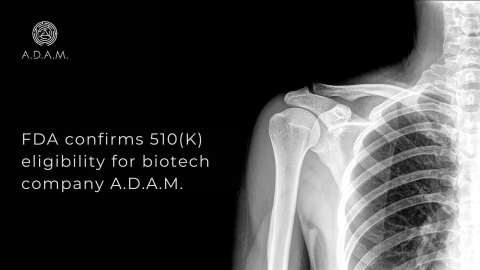FDA Confirms 510(K) Eligibility for Biotech Company A.D.A.M. - 3D Printed Bones Are to Become a Reality in Less Than 2 Years
FDA Confirms 510(K) Eligibility for Biotech Company A.D.A.M. - 3D Printed Bones Are to Become a Reality in Less Than 2 Years
GROTON, Conn.--(BUSINESS WIRE)--In recent months, Global healthcare system problems have become strikingly evident. The outbreak of COVID-19 has exacerbated existing issues in the industry, causing many professionals to rethink the healthcare models currently in place. Breakthrough improvements regarding treatment could surely result from big data and AI applications; however, the basic demand for materials (such as human tissue and organs), remains largely unmet due to supply chain vulnerabilities.
With the adoption of 3D printing in the healthcare industry, many of these problems could be drastically improved. Although many experts claim that current manufacturing methods for medical devices are outdated, the most significant endorsement for the industry-wide application of 3D printing comes from the FDA itself.
According to industry scholars and regulators, cost reduction and time saving are the key benefits of 3D printing applications.
By designing and building an on-demand tissue manufacturing solution, A.D.A.M. (Advanced Development of Additive Manufacturing), a 3D-bioprinting company headquartered in Connecticut, has been pioneering this technology as a service model to effectively address a complex problem. The business model will allow patients to have their tissue modelled — using the MRI/CAT scans stored on the digital platform — and, subsequently, 3D-printed and implanted in certified clinics.
As the FDA has confirmed A.D.A.M.’s 510 (k) clearance eligibility for their 3D-printed bioceramic and modified biopolymer bone implants, the first step is nearing completion.
CEO, Denys Gurak, recently stated: “The FDA’s response means a significant reduction in the time to market the product, from 5 years to 1.5 years, since only the animal trials are required. We are elated to be able to deliver a new breakthrough treatment standard for patients much sooner than previously expected”
The announcement came concurrently with A.D.A.M’s decision to move its R&D office to the University of Connecticut as part of the Technology Incubation Program (TIP). TIP’s main purpose is to grow promising new technology companies; UConn is a leader in scientific innovation, providing A.D.A.M. access to its advanced research facilities, business support services, and students.
With bones being the primary focus, the company’s long-term strategy encompasses a transhumanistic vision. Gurak states that in the future, other tissues will be printed using A.D.A.M.’s proprietary technology.
“Our plan is to go beyond bones and allow people to have their tissues and organs printed for an affordable cost, when and where they need them.
This will allow millions to live their lives to the fullest. Concurrently, our R&D team is looking at potential uses for polymers in printing other tissues, such as heart valves and blood vessels. The horizon is bright''.
Contacts
Denys Gurak, CEO
dg@adamproject.org
